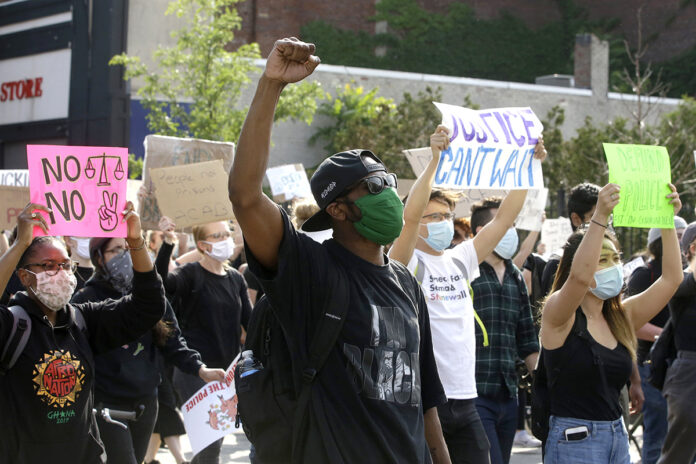Social media platforms can be a complex place for businesses to tread while protests continue nationwide in the wake of George Floyd’s death while in police custody in Minneapolis on May 25.
Such was the case for Allie’s Donuts Inc., which recently posted on Instagram that the North Kingstown shop would end its discount for military and police officers. The post became a national news story with floods of online comments and a line of protesters and supporters outside the business.
It exemplifies the power small-business owners hold in influencing their community, and in turn, the importance of developing a strategy before taking to Instagram or other social media outlets, said Kristen Regine, a professor in the College of Business at Johnson & Wales University.
“This is a prime time for small businesses to do good in their communities,” Regine explained. “People are really listening and are going to determine whether they want to support you as a brand based on what you say and how you say it.”
Indeed, Allie’s saw reactions across the spectrum. The day after the June 6 post, the store reported lines out the door from customers eager to show their support. But opponents also flocked to the shop and to social media with vitriolic comments about the decision.
‘This is a prime time for small businesses to do good in their communities.’
KRISTEN REGINE, Johnson & Wales University business professor
Businesses that take a stance on hot-button issues should be prepared for repercussions, Regine said. Clarity and editing are also integral to a good communication strategy – two things Allie’s appeared to lack.
Regine described the original post as somewhat confusing, leaving customers to draw their own conclusions about whether the end of the discount was a show of support for the Black Lives Matter movement or an unfair criticism of law enforcement.
While owner Matt Drescher in a subsequent Instagram video defended his stance, he acknowledged that the original message – which directly addressed military and police officers, saying “Shame on you for your silence” – failed to convey his true intentions.
“I just wanted to take away a privilege from people so that we could all be equal ... and make a doughnut worth the same amount to every single person that wanted one,” Drescher said in the video.
The 14-minute speech also lacked the kind of concise clarity Regine considered best practices for a business’s social media presence.
Drescher could not be reached for comment.
Hiring a social media expert to develop posts may be beyond the budget and scope of a small business. At minimum, Regine advised a basic two-person editing process for any social media posts.
Asked if business owners should steer clear of political or social issues, Regine emphasized that it was an individual choice, though one that necessitated a well-developed strategy.
Adam Buck, owner of The Small Point Café Inc. in downtown Providence, agreed.
“I’ve always worn my politics on my sleeve,” he said. “I don’t argue with people at the cafe about politics, but I will stand up for what I believe in.”
Like Regine, Buck warned that making a political statement as a small-business owner meant being prepared for potential backlash.
“Being a small-business owner means you know your customers, versus a large restaurant chain where there is a level of distance,” he said.
Nancy Lavin is a PBN staff writer. Contact her at Lavin@PBN.com.











